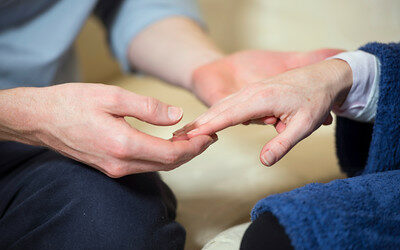Florence had it… have we lost it? Do we still value the warmth, love and care so natural to us that goes hand in hand with our technical skill?
I recently revisited the roots of our modern profession in the form of the work of Florence Nightingale via the definitive biography of her life written by Cecil Woodham-Smith, originally published in 1951.
Two foundational standards that Florence Nightingale introduced in the initiation of nurse training were:
- the ‘Technical record’– the mechanics and tasks of nursing and
- the ‘Moral record’– the character aspects of the nurse, her attitudes, behaviours, the thoughts and feelings she had about her work and the way she did it.
At that time in history all nurses who began Florence Nightingale’s training were female and so in this article the references are always to women. No disrespect to the wonderful men who in more recent times have dedicated themselves to serve in this way.
In May 1860 Florence Nightingale invited women to apply for a rigorous training as a nurse and established a nurses’ home in St Thomas’s Hospital, London, to achieve this.
There were 15 nursing students, called probationers, in the first intake. It was a training of one year, a lengthy time in those days, which involved lectures, working with the doctors and surgeons and undergoing practical application of skills. She had the firm support of Mr. Whitford, the resident medical officer of St Thomas’s who supervised the medical training of the Nightingale probationers from the beginning and continued to do so for 13 years.
There was widespread opposition to her vision of reform in nursing. Interestingly most resistance initially came from within St Thomas’s, from a group led by the Senior Consulting Surgeon Mr. J.F. South. His argument was that nurses were subordinates, ‘in the position of housemaids’ and ‘needed only simple instruction, such as how to make a poultice’.
Because of such criticism, much was rested on applicants having a certificate of ‘good character’ and they ‘were subject to minute examination’. Apparently, it wasn’t easy finding ‘young women of suitable character’.
Florence Nightingale wanted to set a standard whereby nursing would be a vocation that was deeply respected and lift the perception of nurses at that time ‘out of the gutter’. For the most part nurses were considered to be either drinkers, opportunists, morally loose and promiscuous or on the other hand as needing to be nothing other than ‘devoted and obedient’ and able to take simple instruction.
Nurses had never previously been offered such a standard and they were well looked after.
They had a room of their own; food and uniform were provided and they were also paid a stipend.
What was required of them in work was nothing in comparison to what was required in behaviour. Florence Nightingale was setting a new standard for nursing and nursing practice.
Along with their notes on nursing techniques she had them complete a daily diary, not just a record of tasks achieved but how the nurse’s day was, how she interacted with others, her inner workings, observations about life, people, work and herself. This she was required to share with Florence Nightingale at regular intervals. Each nurse was encouraged to share what worked well and what didn’t. Any difficulties they had in relationship with their colleagues or their superiors were examined and dealt with on the spot.
It appears that here Florence Nightingale was offering the beginnings of what we regard as reflective practice and clinical supervision today, setting the standards for the health disciplines to come.
She connected with her probationers and genuinely cared about them. She felt their natures and their thoughts might make or break the work as there was much opposition to what she was doing at the time. The future of nursing hung on their behaviour and inherent qualities as well as their skill.
She could be viewed as having been a hard taskmaster but she was very much involved with making sure her probationers were well supported. Each nurse had flowers placed in their personal rooms each week and literature, books and maps, were provided for them, offering a more expansive view of the world. If a nurse became unwell Florence Nightingale ensured they in turn were well cared for.
She was loved and respected by those she trained and by many doctors and politicians of the time.
Over a number of years further schools began to develop using her training model, established by those who had trained under her and whom were considered ‘up to the task’. Other independent nursing schools began to spring up throughout Great Britain at the same time.
Then in 1886, 26 years after her initiating impulse, a committee of the Hospitals Association proposed to create an independent body of examiners not connected with the training schools and to examine nurses on their technical skill only. A standard of technical nursing would thus be established and the public would be protected from employing nurses who were ‘incompetent’.
Florence Nightingale was vigorously opposed to this as it only looked at the mechanical skill of the nurse and completely left out the essence of the nurse and nursing, the ‘character training’ which she held as of equal importance to technical skill. She held that it could not and should not be left out.
She had made deep connections with her nurses and brought them to their potential, appreciated them not simply for their skill alone but their character and their quality; valuing the nurse for herself and what she brought of herself to people as an intrinsically important part of what supported the patient to heal. She felt one stream without the other simply would not work.
She was not opposed to a move to unify in itself but felt the core foundation had not been securely established and even said that it probably would not be another 40 or 50 years before nursing as a profession was ready for this.
Perhaps that moment is where nursing began to separate off from itself and in attempting to prove ourselves by moving more towards the ‘technical stream’, we began to lose our connection with the ‘art of nursing’; the way in which we do all that we do and the value of this that we bring to each moment.
Do we still value the part of us that contributes equally to making a truly great and deeply caring nurse? The part, perhaps, that is the reason we chose nursing in the first place?
The quality of who we are and the way in which we relate to ourselves and to another. The foundational part of nursing on which all else can be built.
Do we still value the warmth and love and care so natural to us that goes hand in hand with our technical skill?
Florence Nightingale attributed great value to those qualities and standards. She set the standards.
Do we not only still value these standards, have we taken them to a new level?
Reference:
“Florence Nightingale 1820 to 1910” by Cecil Woodham-Smith (copyright 1951)
ISBN978-1-331-83642-1
PBN 10240124
Forgotten Books Copyright 2015
Note:
The author of this article nursed Miss Woodham-Smith in her home in London in the early 1970’s.
Miss Woodham-Smith was the only historian given full access to Florence Nightingale’s voluminous body of written work and to the correspondence with the vast array of people in her life.
Florence had the ear of many politicians and influential people of the times and was instrumental in shaping much more than nursing alone.



